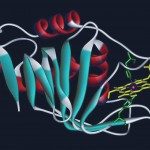Lien vers Pubmed [PMID] – 3125843
Ann. Inst. Pasteur Immunol. 1987 Sep-Oct;138(5):671-85
An analysis of the amino acid sequences of variable regions of human and mouse antibody molecules was performed. It involved comparison of their constituent tetrapeptides with those found in a reference set (the somatic self) built with non-immunological proteins found in a protein data base. It appeared that hypervariable regions, particularly CDR1 and CDR3, are often made up of rare tetrapeptides not present in the reference set. As assessed by simple statistical tests, this bias was significant. We discuss its possible connection with the problem of antibody immunogenicity. This result provides indirect support for the existence of idiopeptides predicted by the “peptidic self model”.

